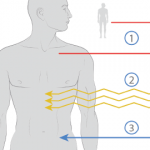Diffuse cutaneous systemic sclerosis (SSc) is often fatal due to progressive internal organ involvement, and disease-modifying anti-rheumatic drugs (DMARDs) and biologic treatments have not shown a sustained survival benefit for these patients. However, research in patients with diffuse cutaneous SSc has demonstrated an overall survival and event-free survival advantage of autologous hematopoietic stem cell transplantation (AHSCT) over monthly cyclophosphamide.
In a single-arm, multicenter clinical trial, Georges et al. sought to determine if AHSCT using an unmodified graft of stem cells from peripheral blood—instead of a CD34+ selected graft—followed by maintenance mycophenolate mofetil could have comparable results to the prior research in this patient population. The study’s primary outcome measure was event-free survival, defined as survival without prolonged organ damage. Secondary objectives included safety and time to disease relapse requiring treatment with additional DMARDs, as well as the overall efficacy of the conditioning regimen with the posttransplant maintenance therapy.
Methods: Twenty patients with high-risk diffuse cutaneous SSc were enrolled in the study. Patients received a nonmyeloablative conditioning regime of 200 mg/kg of cyclophosphamide and horse antithymocyte globulin followed by AHSCT using unmanipulated autologous peripheral blood stem cells (PBSCs). Two months after completing AHSCT, patients received maintenance mycophenolate mofetil.
The mean age of study participants was 46 years (range: 13–70 years), 15 patients were women and five patients were men. The median time from disease onset to hematopoietic stem cell transplantation was 18 months (range: 6–59 months). The study patients completed AHSCT between January 2012 and September 2018.
The Results
The median follow-up was 7.5 years (range 5.6–11.6) after transplant for living patients. Sixteen patients were alive at the last follow-up.
Five years after receiving the stem cells, overall survival was 85% (95% confidence interval [CI] 60.4%–94.9%) and 75% (95% CI 50%–88.7%) for event-free survival.
Eight patients (40%) required treatment in an intensive care unit early after the transplant. Early transplant-related death occurred in two patients (10%). Five patients experienced relapse/progression of SSc after AHSCT. Four of nine patients with anti-RNA polymerase III antibodies had prior scleroderma renal crises and the lowest quartile of estimated glomerular filtration rate (eGFR) on study entry. All four of these patients developed prolonged organ failure or death early after transplant.
It was noteworthy that a minority of patients (38%) who were seropositive for SSc-associated autoantibodies at pretransplant evaluation became seronegative after transplant. It took one to four years for these patients to become seronegative, but a clinically favorable response to transplant did not require conversion to seronegativity.
